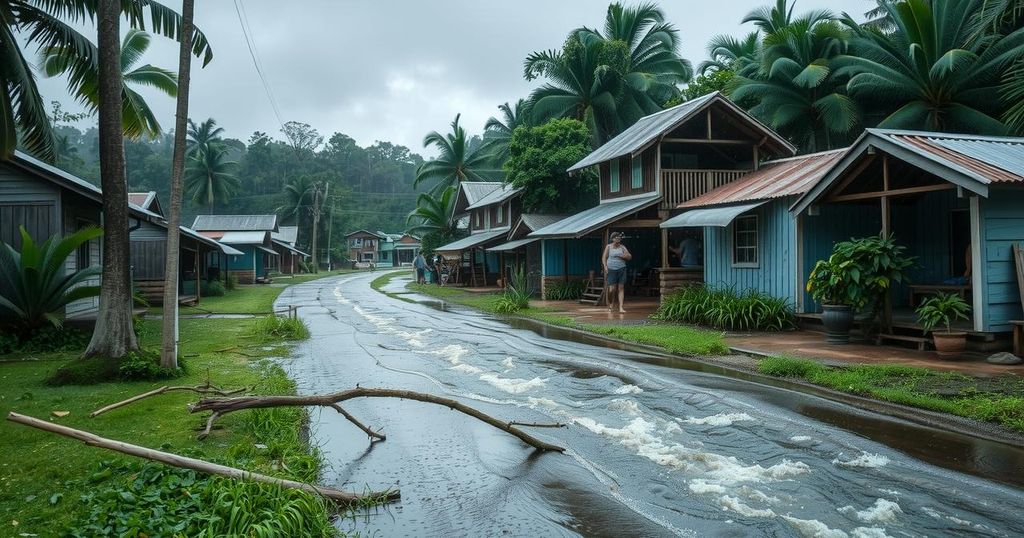Tropical Storm Sara Causes Major Disruptions Across Honduras

Tropical Storm Sara has caused severe flooding in Honduras, impacting over 1,700 communities. With significant rainfall leading to infrastructural damage and evacuations, officials report at least one death and more than 110,000 people affected. The storm’s slow movement exacerbated the flooding, raising concerns about the future frequency of such disasters amid climate change.
Tropical Storm Sara has led to significant disruption across Honduras, affecting over 1,700 communities due to severe flooding and incessant rain. The slow-moving storm, which formed in the Caribbean Sea, has inundated northern Honduras for several days, resulting in up to 500mm of rainfall in some areas. This intense rainfall has swollen rivers, destroyed nine bridges, and inflicted substantial damage on infrastructure, with numerous highways rendered impassable. As of now, officials report at least one confirmed fatality with over 110,000 individuals affected by the storm’s impact. President Xiomara Castro issued warnings for citizens living near rivers, prompting thousands to evacuate to safer locations.
Meteorologists anticipate that Tropical Storm Sara will weaken as it continues towards the southern Mexican state of Quintana Roo. This storm is notable for being the 18th named storm of the current Atlantic hurricane season and the third occurrence in just this month. The recent activity of storms such as Hurricane Rafael caused substantial disruptions in the Caribbean, suggesting a pattern of severe weather events exacerbated by elevated sea surface temperatures. Experts have raised concerns that climate change is intensifying the volatility of such weather systems.
The situation regarding Tropical Storm Sara highlights the broader issue of the increasing frequency and severity of tropical storms and hurricanes, especially in vulnerable regions such as Central America. Historical data suggests that natural atmospheric conditions, coupled with human-induced climate change, are contributing to the escalation of these catastrophic events. As authorities continue to respond to the immediate impacts of the storm, the need for long-term strategies to mitigate damage from future storms is becoming increasingly evident.
The ongoing Atlantic hurricane season has been marked by an unusual frequency of named storms, with Tropical Storm Sara being the latest to cause significant devastation in Honduras. The region is particularly susceptible to hurricanes and tropical storms due to its geographical location, which can lead to heavy rains and flooding. The situation is aggravated by climate change, which has been shown to increase the intensity and frequency of such weather events. Communities affected by the storms often struggle with sudden infrastructural damage and displacement, necessitating robust emergency planning and response measures.
In summary, Tropical Storm Sara has left an indelible mark on Honduras, disrupting the lives of over 110,000 people and resulting in significant infrastructure damage. As the natural disasters continue to escalate, it is imperative for affected regions to adapt to changing climatic conditions and strengthen their disaster preparedness and response strategies. The current situation serves as a stark reminder of the challenges posed by climate change and the urgent need for sustainable solutions to mitigate future risks.
Original Source: www.bbc.co.uk







